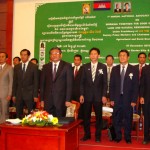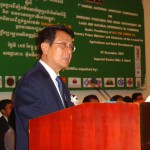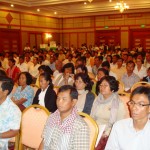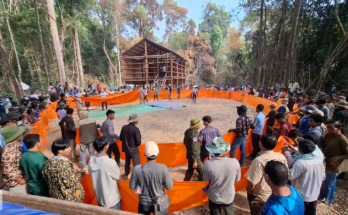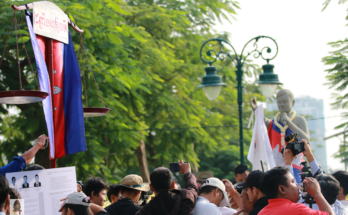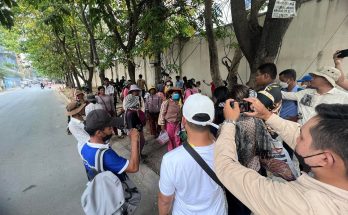JOINT STATEMENT
on
“Issues and Concerns over Serious Impacts Related to
Governance of Land and Natural Resources”
Phnom Penh, 7 December 2012
We, approximately 300 representatives from the provinces of Battambang, Kampong Speu, Takeo, Banteay Meanchey, Uddor Meanchey, Pursat, Rattanakiri, Mondulkiri, Preah Vihear, Koh Kong, Stung Treng, Kampong Thom, Kampong Cham, Kampong Chhnang, Siem Reap, Sihanoukville Municipality, Svay Rieng, Kampot, Kratie, and civil society organizations, including Cambodian Human Rights & Development Association (ADHOC), Advocacy and Policy Institute (API), Cambodian Human Rights Action Committee (CHRAC), Community Legal Education Centre (CLEC), Committee for Free and Fair Elections in Cambodia (COMFREL), Cambodians for Resource Revenue Transparency (CRRT), Cambodia Volunteers for Society (CVS), Development and Partnership in Action (DPA), Gender and Development for Cambodia (GAD/C) Housing Rights Task Force (HRTF), Indigenous Community Support Organization (ICSO), Khmer Youth and Social Development, (KYSD) Life with Dignity (LWD), Star Kampuchea, NGO Forum on Cambodia, Vigilance, World Vision Cambodia (WVC), Youth Resource Development Program (YRDP), and other civil society organizations in Cambodia would like to make a Joint Statement stemming from the issues identified in the 7th Annual National Advocacy Conference on “Working Together for Good Governance on Land and Natural Resources in Cambodia”, held on 07 December 2012 at the Imperial and Garden Hotel, Phnom Penh.
We, as the communities and civil society organizations from all provinces above in Cambodia compliment the efforts by the Royal Government for good governance of land and natural resources in Cambodia. The 7th Annual National Advocacy Conference raises the issues and recommendations, which reflect the great concerns over serious impacts on the people of Cambodia as follows:
I.Extractive Industry
Extractive industry is a sector from which the Royal Government of Cambodia has been receiving important revenues for national eonomic development, but Cambodia has not been prepared for development of this sector yet. At present, the legal and technical frameworks are limited making it difficult to manage this windfall revenue. In contrast, extractive industry has caused negative impacts on the environment through use of chemicals, resulting in damage to water and soil quality, agricultural products, human and animals’ health. Communities have not received information and prior, comprehensive consultations on decisions on mineral resource development projects, leading to violation of human rights, in particular, those of indigenous people.
- Achievements by the Royal Government
The Royal Government is drafting a number of laws to manage extractive industry. It has also developed some infrastructure in mining development areas, and has provided a small amount of compensation for communities affected by mining exploitation.
- Recommendations for the Royal Government
- Environmental impact assessments must be conducted with full participation of the public, and there should be notification at least one month in advance of the assessment.
- Establish an inter-generational fund from the revenues from petroleum, mines, and gas with management by an independent commission, and there should be regular public dissemination of information on use of the fund.
- Build technical capacity for Cambodians on extractive industry.
- Strengthen the rule of law by enforcing existing laws and regulations on extractive industries.
- Implement the Law on the Access to Information, and make information on extractive industry, including revenues, expenditures, contracts, and licenses, etc. publicly available.
- Avoid and cancel mining concessions that affect the land of indigenous communities or the land under the process of registration of communities’ collective land.
- Amend the Law on Mineral Resource Management and Exploitation, and encourage consultations with the public on revising the law. Develop new laws related to extractive industry in accordance with international standards.
Recommendations for the Private Sector
- Make information on plans, agreements with the Royal Government, licenses, revenues, and expenditures publicly available.
- Implement requirements officially agreed upon and provide full compensation to affected communities.
- Establish a social fund for community development projects and provide appropriate job opportunities. Provide opportunities for comprehensive participation by communities and civil society in mineral exploration.
Recommendations for Development Partners
- Continue to provide financial support and technical capacity building, improved legal frameworks, and mineral exploitation for communities.
II. Indigenous People
Studies and identification of indigenous people across the country has not been fully completed yet. There is a lack of awareness-raising on the process of self-identification and registration of collective land, in particular, with indigenous communities in areas where self-identification has not been conducted. Participation and awareness from local authorities on identification of indigenous people is limited. The process of provision of indigenous identity by the Royal Government is slow. The priority of collective land registration is determined after registration of private land. Further, indigenous communities were persuaded to accept private land ownership.
- Achievements by the Royal Government
The Royal Government has been assessing and registering communities as legal entities to own collective land, has produced legal documents for temporary protection of indigenous land, developed national policy on indigenous development, and established technical working groups, such as the Ministry of Rural Development, the Ministry of Interior, the Ministry of Land Management, Urbanization, and Construction, and the International Labor Organization.
- Recommendations for the Royal Government
- Encourage and expedite collective land registration for indigenous communities in order to ensure the sustainability of the right to use land and natural resources, and to maintain indigenous people’s traditions and customs.
- Respect and recognize the traditions and culture which assures indigenous people’s rights and maintains their traditions and customs.
- Widely disseminate information on the process of collective and private land registration.
- Review companies that have already received economic land concessions affecting communities’ lands and forest, and return them to communities.
- Provide information and conduct prior consultations with indigenous people on all development projects.
- Pay appropriate and acceptable compensation to indigenous people who are affected by development projects.
- Adopt the Law on Access to Information in order to enhance participation and the right to decision making on national development.
III. Forestry Issue
Economic land concessions overlap community forestry and protected area communities. Some local authorities do not support community forestry, and some registered communities do not receive support from local authorities either. The process for creating of community forests is complicated with significant cost and delay. There has been clearance of community forestry and tree felling in the territories of community forestry by some powerful people, traders, and economic land concessionaires. Army barracks have been built on community forests that have already been confirmed with the Royal Government, such as: the cases of the communities of Dong Beng, Andoung Bor, Rumduol Veasna, and the forestry salvation community in Uddor Meanchey province. There has been intimidation against forestry activists by some companies, traders, and officials. There is a shortage of funds for supporting community forestry.
- Achievements by the Royal Government
Communities and NGOs working in the forestry sector recognize the objectives of the Royal Government of Cambodia, in particular, reforestation of eroded soil by the Forestry Administration as indicated in the Joint Monitoring Indicators (JMIs). However, NGOs and civil society organizations are disappointed because “reforestation” includes planting of rubber trees in economic land concessions, such as Acacia and eucalyptus trees.
Communities and NGOs highly appreciate the demarcation of forestry boundaries and protected areas according to plans, but we are deeply concerned about the rapid increase in the number of economic land concessions granted in protected areas, including the Bokor, Botum Sakor, Virak Chey, Oral, Boeng Per, Lumphat, Namlear, and Keo Seima.
As of November 2011, 130 areas of community forestry with a total land area of 141,031 hectares were approved by the Ministry of Agriculture, Forestry, and Fisheries. We congratulate this effort. However, NGOs and some communities have observed that the approval process of the Ministry of Agriculture, Forestry, and Fisheries has been slow and difficult, especially when compared with the process of granting economic land concessions.
NGOs and civil society organizations recognize that the initiative to develop the road map of the national program on reduction of carbon emissions due to forest loss and erosion is more participatory than development of other forestry policies, giving opportunities for NGOs and civil society organizations to raise concerns and to contribute ideas. We also recognize that this road map structure allows NGOs and civil society organizations to have their representatives in groups that make important decisions.
- Recommendations
- Revise the procedure for establishment of community forestry and expedite the granting of land for community forestry (identification of potential areas by the Ministry of Agriculture, Forestry and Fisheries.
- Address impacts on communities and the environment in a just and prompt manner.
- Development must involve public consultations with the people as stipulated under legal standards.
- The Committee for Management of Community Forestry and people as well as local authorities must collaborate well with community forestry.
- Disseminate the Laws on Forestry and Environment widely.
IV. Urban development, Resettlement, and Forced Evictions
In the context of development of the Kingdom of Cambodia, a number of impacts arise from such development affecting people’s livelihoods, especially caused by eviction and resettlement. These issues include forced evictions without fair and just compensation, and lack of prior, appropriate public consultations leading to losses of residential land. Eviction can lead to loss of daily occupations, children’s future, and indebtedness, loss of people’s assetts, affecting childrens´ and womens´ well being, and ultimately resulting in people’s poverty. Moreover, due to resettlement, people face difficulties in access to public services, such as: markets, schools, hospitals, etc. Lack of extensive information and consultation with the people on most development plans of the Royal Government has led to people becoming victimized as a result of violation of human rights, and inappropriate solutions by those development projects[1]. In addition, we have observed that most eviction activities by competent authorities have involved violence and intimidation. Some protesters were arrested by the authorities, sent to court, put under detention, and tried unjustly. People are obliged to resettle as required by the authority or the investment company without proper compensation. Some people were discriminated against by the authority to accept compensation. Sometimes, some competent officials have been involved in corruption or irresponsible practices and were inactive in responding to the people’s needs. Lack of responsibility towards the people by officials in execution of their duty to protect the people has diminished peoples trust in State authority.
- Achievements by the Royal Government
Along with these challenges, we have also seen some positive results from the government’s development projects and policies in enhancing the beauty of some cities and urban areas. Among these are infrastructure facilitating people’s livelihoods, schools for children, hospitals, and health care facilities, factories to give employment to the people, and buildings (condominiums, apartments, mansions, shopping centers, high-rise buildings) and modern centers.
- Recommendations
For the Royal Government
- Implement systematic land registration for poor communities in provinces, cities, and capital cities and expedite granting land ownership to all people in the whole country.
- Disseminate and consult extensively on development projects with people, especially the communities living in affected areas before approving private or other forms of investment.
- All development must benefit people inhabiting development locations.
- Ensure an independent and impartial judiciary, respect human rights and end the use of the judiciary to oppress people who demand their land and housing rights.
- End forced evictions, but carry out in-place development.
- Immediately release from prison the people who demonstrated for land and housing rights.
- End obstruction of non-violent activities by victims, e.g., petitions and requests.
For donors:
- Continue to support all projects and activities to settle land and housing disputes effectively.
- Continue to collaborate with the Royal Government in systematic land registration and encourage the Royal Government to continue to address the requests and recommendations by victims.
V. Land Registration, Land Conflicts and Implementation of Executive Order No. 001
Although the government’s old policies and new activities in recent land reform and Executive Order No. 001 are timely and laudable actions, to date we have observed that there have been some challenges in actual implementation and effective actions. For instance, land registration and land conflicts still occur and comprehensive solutions of the issues have not yet been reached. As the scope of Executive Order No. 001 is limited other disputes, such as disputes related to social land concessions, cannot be addressed timely. Clearance of forested areas and crops and land encroachment by companies still occurs despite the Government’s Executive Order No. 001. Moreover, a small number of youth volunteers groups could not fully implement government’s Executive Order No. 001 to solve land disputes, as disputes in some areas have been handled by the competent authorities.
- Achievement by the Royal Government
Along with these challenges, we have also observed some progress in the issues above. Competent authorities have addressed the issues above. They have taken back some land from some companies and given it back to the people. Some people who were not covered under the areas specified by the Executive Order No. 001 have also received land titles, which is satisfactory for the people and encourages more effective solutions. In some areas, after addressing land issues, the authorities also developed infrastructure for people in those areas.
- Recommendations
For the Royal Government:
- Address and measure land in disputed areas rapidly.
- Establish an effective mechanism to monitor and evaluate the work by youth volunteers and authorities in taking part in measuring and addressing land conflicts.
- Allocate and classify land for social land concessions benefitting the poor
- Consult extensively with affected people and address issues in a peaceful manner and pay compensation at a price acceptable to affected parties.
For donors:
- Monitor the implementation of government’s policies, especially the implementation of Executive Order No. 001.
- Continue to support the activities of civil society organizations and communities in in the land sector to ensure tenure security and to contribute to poverty reduction.
For further information, please contact:
- Mrs. Kha Sros, Representative of mining communities, Tel: 097 503 0567
- Mr. Ros Han, Representative of mining communities, Tel: 012 1827 245
- Mr. Chea Chuong, Representative of indigenous and forestry communities,
Tel: 097 9690715
- Mr. Pich Nim Khuon, Representative of land and housing communities,
Tel: 017 872 195
- Mr. Thun Saray, President of, Cambodian Human Rights & Development
Association in Cambodia (ADHOC), Tel: 016 440 044
- Mr. Suon Bunsak, Executive Secretary, Cambodian Human Rights Action
Committee (CHRAC), Tel: 092 344 357
- Mr. Lam Socheat, Deputy Director, Advocacy and Policy Institute (API),
Tel: 077 555 679
- Mr. Chhit Sam Ath, Executive Director of The NGO Forum on Cambodia,
Tel: 012 928 585
- Mr. Mam Sambath, Executive Director of Development and Partnership in
Action (DPA), Tel: 012 779 734
- Mr. Yeng Virak, Executive Director of Community Legal Education Centre
(CLEC), Tel: 012 801 235
- Mr. Kuol Panha, Executive Director of Committee for Free and Fair
Elections in Cambodia (COMFREL), Tel: 012 942 017
- Mr. Chhay Sarath, Executive Director of Cambodians for Resource Revenue
Transparency (CRRT), Tel: 012 589 958
- Mr. Pen Somony, Executive Director of Cambodia Volunteers for Society
(CVS), Tel: 012 708 093
- Mrs. Ros Sopheap, Executive Director, Gender and Development for
Cambodia (GAD/C), Tel: 012 627 857
- Mr. Sea Phearun, Director, Secretariat of the Housing Rights Task Force
(HRTF), Tel: 012 852 325
- Mr. Sao Vansy, Executive Director of Indigenous Community Support
Organization (ICSO), Tel: 012 813 744
- Mr. Chhuon Borith, Executive Director of Khmer Youth and Social
Development (KYSD), Tel: 012 798 488
- Mr. Sam In, Executive Director of Life with Dignity (LWD),
Tel: 012 55 18 86
- Mrs. Chet Chakrya, Executive Director of Star Kampuchea, Tel: 012 802 460
- Mr. Sim Tara, Senior Program Manager ofWorld Vision Cambodia
(WVC), Tel: 012 771 051
- Mr. Cheang Sokha, Executive Director of Khmer Youth and Social
Development (YRDP), Tel: 012 360 464
- Mr. Kim Sovann, Executive Director of Vigilance, Tel: 012 957 282
[1] Those affected communities include, but not limited to: Dey Krahorm, Rikreay, Beoungkak Lake, Borei Keila, and other communities. At the moment, communities locating near the international airport, and others are facing threat of evictions as well.
Download statement below (PDF files, English and Khmer).

